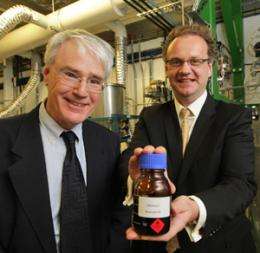Improved biofuels with new plant

A new pilot biomass processing plant at the University of Sydney gives researchers an opportunity to improve biofuel production, taking it a step closer to becoming a commercially viable, sustainable energy source.
As Peak Oil approaches, demand for renewable liquid transport fuels is increasing but a cost-effective means to produce non-food based biofuels on a large scale is yet to be found. The NCRIS Hydrothermal Biofuels Research Pilot Plant allows experimentation with the variables of production, with the aim of finding a viable processing method.
"Before biofuels become a viable alternative to petrol we need to improve many aspects of production," says Professor Brian Haynes from the School of Chemical and Biomolecular Engineering, where the plant is housed.
"So-called first generation biofuels such as biodiesel compete with food supplies," says Professor Thomas Maschmeyer from the School of Chemistry.
"We're looking at increasingly important methods that produce fuel from whole plants, including stems and leaves, and not just seeds. Sources might include sugarcane bagasse or forestry by-products.
"The energy required to produce biofuels also needs to be reduced. Our plant employs heat exchangers, able to recover and reuse the majority of the energy expended in the production process."
The plant converts biomasses into biofuel under hydrothermal conditions, created by hot water (up to 350 degrees Celsius) and high pressure (equivalent to up to 250 atmospheres).
"Water is an environmentally benign processing fluid but using it at so-called near critical point conditions creates significant engineering challenges, not the least of which is safety," says Professor Haynes.
Operating on a small scale, the new plant provides flexibility in the choice of operating conditions to enable researchers to develop optimal methods.
They can experiment with different production methods relatively cheaply and quickly, facilitating both fundamental and industrial research.
Researchers will also look at how biomass can be used to more efficiently produce chemicals used in food, fragrance and plastics production.
The plant will be operated jointly by Professor Haynes' research group within the Faculty of Engineering and IT and researchers from the Faculty of Science's School of Chemistry, led by Professor Thomas Maschmeyer.
It was officially opened this month by Deputy Vice-Chancellor (Research) Professor Jill Trewhella. Its construction has been funded through the Federal Government's National Collaborative Research Infrastructure Strategy, with additional support from the NSW Science Leveraging Fund and the University. University researchers will collaborate with biofuels producer Ignite Energy and others in this emerging area.
Provided by University of Sydney
















